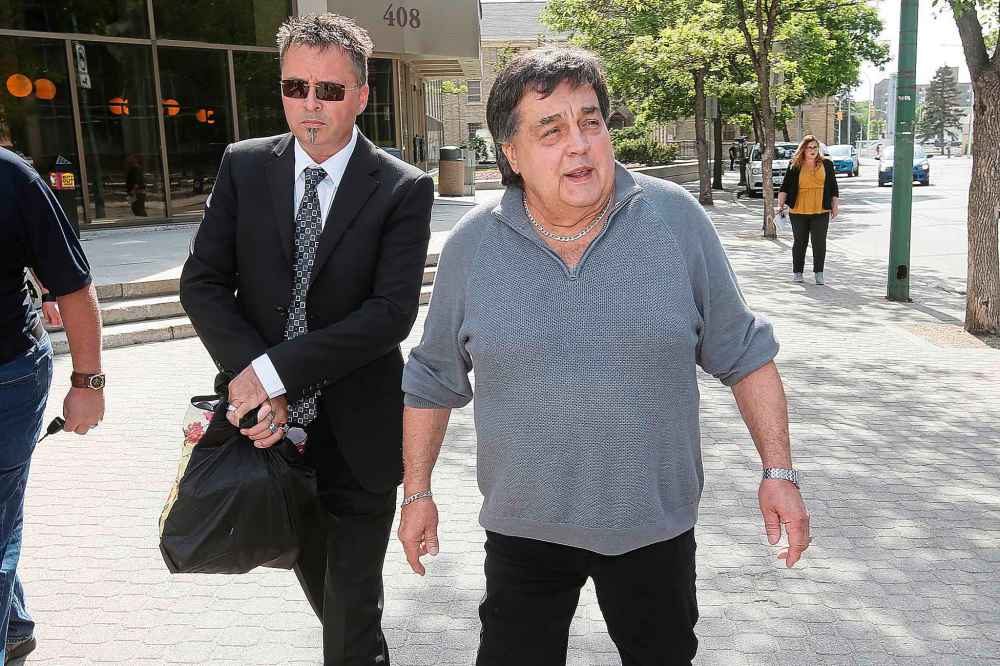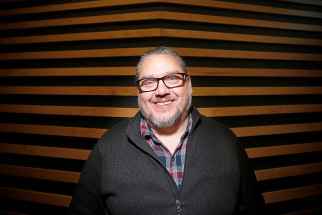Court of Appeal quashes Ostrowski first-degree murder conviction
Read this article for free:
or
Already have an account? Log in here »
To continue reading, please subscribe:
Monthly Digital Subscription
$0 for the first 4 weeks*
- Enjoy unlimited reading on winnipegfreepress.com
- Read the E-Edition, our digital replica newspaper
- Access News Break, our award-winning app
- Play interactive puzzles
*No charge for 4 weeks then price increases to the regular rate of $19.00 plus GST every four weeks. Offer available to new and qualified returning subscribers only. Cancel any time.
Monthly Digital Subscription
$4.75/week*
- Enjoy unlimited reading on winnipegfreepress.com
- Read the E-Edition, our digital replica newspaper
- Access News Break, our award-winning app
- Play interactive puzzles
*Billed as $19 plus GST every four weeks. Cancel any time.
To continue reading, please subscribe:
Add Free Press access to your Brandon Sun subscription for only an additional
$1 for the first 4 weeks*
*Your next subscription payment will increase by $1.00 and you will be charged $16.99 plus GST for four weeks. After four weeks, your payment will increase to $23.99 plus GST every four weeks.
Read unlimited articles for free today:
or
Already have an account? Log in here »
Hey there, time traveller!
This article was published 27/11/2018 (2569 days ago), so information in it may no longer be current.
More than 30 years after a Winnipeg man was convicted of a murder he claims he didn’t commit, undisclosed police notes and a secret deal involving a key witness has led to Manitoba’s top court to reject the decision.
The Court of Appeal officially quashed the first-degree murder conviction 69-year-old Frank Ostrowski has been fighting since a jury found him guilty in 1987 of orchestrating the drug-related shooting of Robert Nieman, 22.
In a long-awaited, 44-page decision released Tuesday afternoon, the panel of judges decided to enter a judicial stay of proceedings on Ostrowski’s murder conviction, after Crown lawyers acknowledged there had been a miscarriage of justice.

“I’m vindicated and I’m a free man now, and nobody can look at me and say, ‘There’s a murderer,'” Ostrowski said, finding out about the court’s decision via a phone call from the Free Press.
“I feel good about it, but I would have liked to have an acquittal… a total acquittal would take away all stigma, you see.”
Ostrowski hasn’t been acquitted because there’s still plenty of evidence against him, the appeal court ultimately decided.
Despite fresh evidence that only came to light after Ostrowski retained wrongful-conviction lawyers to work on his appeal, the panel of judges decided it would still be reasonable for a jury to find Ostrowski guilty if the case were to undergo a new trial.
A new trial won’t happen, all sides agreed, because of the decades that have gone by since the 1986 shooting.
The “miscarriage of justice” for Ostrowski, Court of Appeal Justice Holly Beard wrote in the decision, was two-fold: a prosecution deal with a police informant, Matthew Lovelace, who testified against Ostrowski during his trial was never disclosed to defence lawyers. Neither were notes and a report from a Winnipeg Police Service officer, Sgt. N. Jacobson, who had a phone conversation with the informant a few hours before the murder.
“There were inconsistencies between Mr. Lovelace’s testimony about the content of the message that he left with Sgt. Jacobson, the note that Sgt. Jacobson left for the other officers and the Jacobson report that could have been used by the defence to discredit Mr. Lovelace’s testimony, had they been disclosed to the defence prior to the murder trial,” Beard wrote in the decision, also signed by Justices William Burnett and Jennifer Pfuetzner.
Ostrowski’s lawyer, James Lockyer, founding director of the Association in Defence of the Wrongfully Convicted, had been working on the appeal since 2001, alongside Winnipeg defence lawyer Alan Libman. On Tuesday, he said he’s happy for Ostrowski but disappointed no one has been held accountable for how the case was handled as far back as 1986. Since then, rules for the disclosure of evidence and Crown-witness deals have been tightened.
“After 32 years, it’s good that Frank’s conviction is finally being set aside and he no longer has it on his shoulders. But it is unfortunate, as so often happens in these cases, that there’s no responsibility,” Lockyer said. “Thirty-two years, a miscarriage of justice, and we sort of shrug our shoulders and carry on.
“It’s not good enough to me, but I’m afraid that’s what’s happened here. There’s no accountability,” he said.
“An acquittal is a more resounding exoneration. No question, a judicial stay of proceedings seems a rather dry way to end a 32-year miscarriage of justice.”
Prior to Ostrowski’s trial in 1987, the defence lawyers representing him suspected there was a deal between prosecutors and Lovelace, who later had all of his drug charges dropped by the Crown after he testified about Ostrowski’s alleged involvement in ordering Nieman’s death.
Crown prosecutors handling the murder trial maintained there was no deal, and the jury was never told about one.
The provincial prosecutors would later testify they didn’t know about the deal Lovelace’s defence lawyer made with federal prosecutors who were handling the drug charges against him. On appeal, Ostrowski’s lawyers argued they must have known.
Several prominent police officers, Crown attorneys and judicial staff who worked on the case in the late 1980s — including former senior Crown prosecutor George Dangerfield, former junior Crown prosecutor Sidney Lerner (now a provincial court judge) and Lovelace’s former lawyer, Hymie Weinstein, were called to testify in the Court of Appeal last year.
Weinstein testified he wanted the deal to be kept secret from his client until after Ostrowski’s murder trial so it wouldn’t taint his testimony.
Evidence of the deal was key to getting Ostrowski’s conviction overturned, and it took years to get proof, Lockyer said. There was no mention of it in Manitoba Justice’s file on the murder case. So Lockyer turned to the feds.
“I remember I had asked the federal Crown to disclose the file to me, and they called me back and said, no, that they couldn’t,” he recalled. “I said, if you were me, would you want to see what was in that file? And there was a long pause and then he said, ‘Yes, I would.’ And so I chased it.”
In 2014, then-minister Peter MacKay decided there was a reasonable likelihood of a miscarriage of justice and referred the case back to Manitoba’s Court of Appeal. It took another three years for the court to hear the case — a portion of which still remains sealed and protected by a publication ban — and six months to release its decision.
Ostrowski officially joins the ranks of other high-profile wrongful-conviction cases in Manitoba that were prosecuted by Dangerfield: Kyle Unger, James Driskell and Thomas Sophonow.
He’s been on bail since 2009, following court-ordered conditions that end with the overturning of his conviction.
“I’m happy that I’m a free man now, and I’m upset at the judicial system for taking so long to come to this kind of decision. There should be a process set up so that it would never take this long for anybody else,” Ostrowski said.
katie.may@freepress.mb.ca
Twitter: @thatkatiemay
wfppdf:https://wfpquantum.s3.amazonaws.com/pdf/2018/87370_r_v_ostrowski_2018_mbca_125.pdf|Ostrowski decision:wfppdfTimeline
1986
Sept. 9: Jim Luzny arrested on drug-trafficking charges.
Sept. 13: Matthew Lovelace arrested on drug-trafficking charges.
Sept. 14: Frank Ostrowski arrested on drug-trafficking charges.
Sept. 24: Lovelace calls Winnipeg police and says Ostrowski is planning to kill “a friend” that he describes as “the carpenter.”
Sept. 25: Robert Nieman, 22, is shot three times in the head as he returns to his apartment; Ostrowski arrested and charged same day with attempted murder. Robert Dunkley and Luis Correia are also arrested and charged with attempted murder.”
Oct. 21: Nieman dies; charges upgraded to first-degree murder.
1987
May 13: Luzny is acquitted.
May 23: Ostrowski and Correia are convicted of first-degree murder; Dunkley pleaded guilty just before the trial and was convicted of second-degree murder.
1988
September: Ostrowski’s conviction is heard by the Manitoba Court of Appeal.
November: At Lovelace’s federal drug trial, prosecutors call no evidence and an acquittal is entered.
1989
February: Ostrowski’s appeal is dismissed.
2001
The Association in Defence of the Wrongly Convicted (now Innocence Canada) agrees to take on Ostrowski’s case.
2003
AIDWYC investigation uncovers evidence of a deal with Lovelace that was never disclosed to defence or jury; also discovers the Jacobson report that shows Lovelace’s tip to police was tied to another man he feared would be killed, not Nieman.
2009
July: An application is made to the federal Justice Department for a review of Ostrowski’s claims of innocence.
December: Manitoba Court of Queen’s Bench orders Ostrowski released on bail, after spending 23 years in prison, pending review of his case by Ottawa.
2014
November: Then-federal justice minister Peter MacKay determined that based on the Crown’s failure to disclose “a significant amount of relevant and reliable information,” he was convinced that there was “a reasonable basis to conclude that a miscarriage of justice likely occurred.” Case is referred to the Manitoba Court of Appeal.
2017
June 1: Hearings begin at the Court of Appeal.
2018
May 28: Crown lawyers admit the murder case against him was a “miscarriage of justice” in appeal final arguments. Manitoba Justice tells Appeal Court it is willing to expunge Ostrowski’s conviction and enter a stay of proceedings. Ostrowski’s legal team presses for an acquittal.
November 27 : Manitoba’s Court of Appeal officially overturns the 1987 murder conviction that sent Ostrowski to prison for 23 years. It enters a judicial stay of proceedings and rejects Ostrowski’s request for an acquittal. The panel of judges grants Ostrowski’s appeal and order a new trial. But they decide a new trial should not proceed, hence the stay of proceedings.

Katie May is a general-assignment reporter for the Free Press.
Our newsroom depends on a growing audience of readers to power our journalism. If you are not a paid reader, please consider becoming a subscriber.
Our newsroom depends on its audience of readers to power our journalism. Thank you for your support.
History
Updated on Tuesday, November 27, 2018 7:06 PM CST: Changes copy
Updated on Tuesday, November 27, 2018 7:57 PM CST: Fixes related items.
Updated on Wednesday, November 28, 2018 10:14 AM CST: Photo changed.













